
Occupy Central
Occupy Central is a civil disobedience movement which began in Hong Kong on September 28, 2014. It calls on thousands of protesters to block roads and paralyse Hong Kong's financial district if the Beijing and Hong Kong governments do not agree to implement universal suffrage for the chief executive election in 2017 and the Legislative Council elections in 2020 according to "international standards." The movement was initiated by Benny Tai Yiu-ting (戴耀廷), an associate professor of law at the University of Hong Kong, in January 2013.
OCCUPY CENTRAL - DAY 60: Full coverage of the day’s events
PUBLISHED : Tuesday, 25 November, 2014, 1:11pm
UPDATED : Wednesday, 26 November, 2014, 5:47am
Hong Kong democracy in balance as Occupy Movement nears end
Hong Kong's path to democracy is likely to be gradual, vacillating between liberal and populist ideals
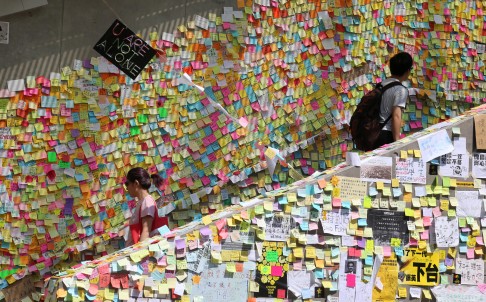
It may be too early to predict political life after the Occupy movement ends.
Commentators have mentioned further political tightening by Beijing, urgent attempts to address society's deep contradictions, political gridlock, and further polarisation of the community that could lead to a rise in populism.
The future of democracy in our city may well hang in the balance, but will it follow the path of a liberal democracy or a populist democracy? These two approaches provide different interpretations of the purpose and consequence of voting and elections. The starting point for liberal democracy is "negative" liberty, which means the absence of coercion or interference by others, especially government, in one's activities.
The liberal fear is that the government can easily deploy force against citizens to make them support unpopular policies. The liberal hope is that officials will be restrained from such behaviour out of fear of losing the next election. The defence of liberty lies in the discipline of elections.
Liberal democracy requires a popular vote to ensure participation and equality and an election with limited tenure. It makes no claims about the quality of the candidates. The function of voting is to control officials, and no more.
A major challenge for liberal democracy is how to blunt majority rule so as to protect individual liberty and minority interests. The solution is to surround voting and elections with numerous restricting institutions, such as independence of the judiciary, freedom of the press and election rules, to curb government powers.
Populist democracies may revert to autocracies
Populist democracy, on the other hand, embraces "positive" liberty, which is the exercise of control over one's life and destiny.
A society is considered free when all its members play an active role in controlling its destiny through participation in democratic processes.
Populist democracy presumes every citizen shares a common view of the good and the right thing to do, and that there are no irresolvable personal concerns. The "general will" of society is discovered by consulting citizens and tallying their common interests.
The referendum is the ultimate instrument for discovering the "general will". The Occupy movement made extensive use of public consultations and an unofficial referendum to reveal the public's will.
The populist ideal requires elected governments to move swiftly to embody in law the winning election platform. Constitutional constraints and due processes, as seen in liberal democracy, are deemed intolerable because they retard the popular mandate. But with the constraints removed, it becomes easy to change electoral arrangements. For this reason, populist democracies may revert to autocracies. Fascist Germany is an example.
Liberal and populist democracies also treat government output differently. The populist sees it as an expression of the general will, the liberal sees it as no more than the decree of legislators or judges, accepted by citizens.
Liberal democracy is non-judgmental and respects the plurality of individual values and desires. The only purpose for which state power can be rightfully exercised over an individual is to prevent harm to others.
However, it does have a psychological weakness. Since negative liberty is about not having constraints, individuals can increase their freedom by relinquishing desires that are likely to be frustrated, and cease to aspire to higher goals. For example, slaves who are treated well may cease to wish to be free.
Proponents of populist democracy, on the other hand, say you cannot increase your freedom just by shrinking your desires. Freedom involves being your own master, rather than letting someone or something else control you. Many of these ideas were delineated by Isaiah Berlin, who worried the ideal of positive liberty might impel revolutionary movements to become totalitarian because they are only willing to tolerate their own conception of what is good and right.
By contrast, negative liberty sits comfortably with pluralistic values.
Which path will Hong Kong go down? Liberal democracy seemed possible in 1997 but the Occupy movement has tilted the pendulum towards populism. The road to democracy is likely to vacillate between these two ideals. But the diversity of values and interests in Hong Kong can only be satisfied by a liberal system.
Still, populism will have its appeal in a society divided between haves and have-nots, where dreams and destinies are at loggerheads and the people desperately want to hear an uplifting narrative to lift them above the political mess and life's banalities.
Richard Wong Yue-chim is Philip Wong Kennedy Wong Professor in Political Economy at the University of Hong Kong
This article appeared in the South China Morning Post print edition as Which way forward?
Mong Kok shopkeepers welcome reopening of road blocked by Occupy
PUBLISHED : Wednesday, 26 November, 2014, 3:31am
Pro-democracy protesters sleep at protest site in Mongkok. Photo: Felix Wong
Argyle Street businesses yesterday welcomed the reopening of the road that had been blocked for nearly two months but some were worried that trade would not improve in the short term.
They spoke as a group of residents published a survey indicating that about three-quarters of 160 small businesses in Mong Kok had lower turnover last month compared to the same period a year ago - and about 90 per cent said Occupy was to blame.
Ms Lo, a supervisor of the Green River restaurant, said takings had been down some HK$20,000 a day since the Occupy movement began. "If the traffic is inconvenient, people will not come ... I am very happy about the reopening of the road," she said.
But a staff member at a nearby dispensary was not so optimistic. "I don't think there will be much change in the short term ... I just hope in the long run business will be better than now," the employee, giving his name only as Ng, said.
His remarks matched the findings of the survey by residents who published their report on Facebook. The group said they interviewed proprietors of 160 small shops on streetfronts or in shopping malls in Mong Kok. About 40 per cent were restaurants, boutiques, cosmetics or mobile phone sellers. Most did not have a branch elsewhere.
Seventy-six per cent said business last month was worse than a year ago, and among those facing decreased turnover, a third said business dropped by more than 40 per cent. Almost 90 per cent said the Occupy protest was to blame as "customers were worried about [the lack of] public order, personal safety issues … and traffic congestion".
On why business turned bad last month, the surveyed shopkeepers were allowed to pick more than one answer from five options. Apart from the Occupy protests, 44 per cent of the surveyed shopkeepers said "customers were less eager to buy".
On their expectations, 54 per cent said they believed business this month would be worse than a year ago, 31 per cent said it would be more or less the same while only 11 per cent believed it would be better.
Citing their finding that 83 per cent of the shopkeepers wanted Occupy to end "immediately", the group said the survey results reflected fundamental differences among different generations and sectors in society.
"The viewpoint that 'fighting for democracy shouldn't [mean] hindrance for other people' is closely related to the question of 'how far are you willing to go to fight for democracy'," the report says. "And as long as the majority of people don't have a consensus on this question, we can expect Hong Kong's democratic movement to be full of tension in the future."
This article appeared in the South China Morning Post print edition as Shopkeepers welcome reopening
Protesters in tense stand-off
After more than 50 days blocking a main intersection in Mong Kok, demonstrators obey court injunction before occupying another site
PUBLISHED : Wednesday, 26 November, 2014, 3:31am
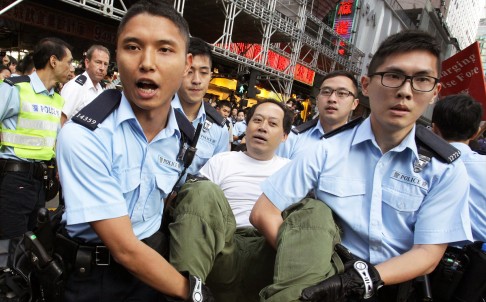
As one road opened in Mong Kok yesterday another closed, with protesters declaring they would not give up until there was a political solution to their grievances.
 After more than 50 days encamped in Mong Kok, they were not about to give up so easily.
After more than 50 days encamped in Mong Kok, they were not about to give up so easily.
"It's impossible to get everyone to leave," occupier Zero Lam Tat-wing said as police and bailiffs moved in.
"They need to solve what is a political problem using political means, not through the courts," he said, referring to injunctions obtained by transport operators that were enforced yesterday.
After clearing one lane of Argyle Street, police were left in a tense stand-off last night with demonstrators who had closed off Portland Street.
"With Argyle lost, we will simply just occupy another intersection which does not fall under the court injunction. Either way, it will be illegal and we recognise this," protester Kolson Ko said. "The whole point is to block traffic and we need to find another bargaining chip."
The action began at 9.20am when Maggie Chan Man-ki, legal counsel for Chiu Luen Public Light Bus Company, which obtained the injunction to clear the street, showed up to read out the court order urging protesters to leave immediately with their belongings.
An hour later the court bailiff removal team started dismantling the road barricades one by one, starting with those at the junction of Nathan Road and Argyle Street.
The removal was completed in less than an hour, with minimal resistance from protesters, and partial traffic began to flow.
As Chan and the bailiffs entered the Occupy zone to clear out tents, they were surrounded by hordes of journalists and protesters.
The operation was slowed as they were faced down by protesters who demanded they be allowed to personally remove some of the barricades. Some Occupy supporters also loudly complained that the injunction was "not clear enough".
After negotiations between student activists and the removal team, the demonstrators were given 30 minutes to do the job.
"Occupiers should pack up and leave now. Otherwise, [their belongings] will be dealt with as disposed items and rubbish," Chan said. She warned protesters not to interfere with bailiffs' actions or police might step in. Protesters would face contempt of court charges, she added.
In response, protesters in masks and helmets shouted: "We want real suffrage." Some also held up three fingers - a reference to the sci-fi film The Hunger Games, in which fictional denizens rise up against an authoritarian regime.
When police reinforcements arrived they issued warnings to protesters demanding that they obey the injunction and leave or face arrest for contempt of court.
"Police should explain when it's right to intervene," argued the Federation of Students' Yvonne Leung Lai-kwok, adding the court document required police to disclose when and if their assistance had been requested by the bailiffs. "Protesters have the right to know," she added.
Chaos ensued as protesters regrouped on Portland Street, just outside the Langham Place mall, where the new stand-off went on into the night.
This article appeared in the South China Morning Post print edition as Protesters in tense stand-off
LIVE: Stand-off ensues between protesters and police in Mong Kok
Traffic grinds to a halt in Mong Kok again as police attempt to break up crowds
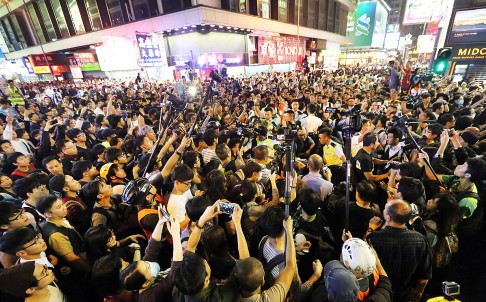
Crowds of protesters are involved in stand-off with police in Mong Kok after officers earlier took control of the junction of Shantung Street and Sai Yeung Choi South Street by forcing people back on the pavement.
Despite repeated appeals from police asking people to leave peacefully, the crowd responded by chanting "I want universal suffrage" and "I want shopping".
This was a response to Chief Executive Leung Chun-ying's call earlier today asking people to go shopping in the area that was earlier occupied.
Lan Lau, who works for a cake workshop, caught the crowds attention in Mong Kok by raising a sign that read: "I want Nathan Road" outside the Bank Centre Mall.
"The occupation has to be continued, as everyone here agrees. I want to see results, such as an end to functional constituencies," she said.
Shortly before 9pm, scores of police officers armed with shields and helmets forcibly pushed crowds on the junction of Shantung Street and Sai Yeung Choi South Street back on the pavement.
Police were appealing to crowds gathering in the area to disperse peacefully and not to cause trouble.
Several hours after police removed demonstrators’ barricades had resumed along Nathan Road, traffic in Mong Kok was brought to a standstill once again as police attempted to break up crowds forming a suspected illegal assembly.
At around 7pm, outside the Bank Center Mall on Nathan Road, police officers suspected several people of taking part in an illegal assembly and tried to push them back to Nelson Street.
A commotion then erupted, and scores of police officers soon called in to deal with the situation. At least two people were taken away. Red flags were raised telling the crowds not to charge at police or they would use force.
Plain-clothed police officers were also deployed, shouting at pedestrians to tell them to leave the area as officers formed a long cordon along the south lane of Nathan Road. Two of the three lanes were at one stage closed to traffic.
Chaos also spilled over into Sai Yeung Choi South Street later, after a large crowd demanded “open roads”.
More police reinforcements, geared with helmets and shields, then arrived forming a long cordon along the street to maintain order and many shops in Sai Yeung Choi South Street closed their shutters.
A form five student Rachel Leung said she didn’t understand why police had to be there.
“It is not necessary to have so many police here, no one is charging,” said Leung, who came after school.
A section of the Sai Yeung Choi South Street was also closed temporarily.
Pro-democracy protesters vowed to return to Mong Kok tonight after hundreds of police officers demolished barricades and reopened Nathan Road to traffic following weeks of occupation.
The operation to clear the barriers and tents from the thoroughfare got underway just after rush hour this morning, watched closely by police officers carrying tanks full of pepper spray solution and hand pumps.
We’re planning to continue our civil disobedience action when the plaintiff and police officers come, and then we are ready to get arrested
Several protesters were detained, including prominent activists Joshua Wong Chi-fung from Scholarism, Lester Shum from the Federation of Students, Szeto Tze-long from Chinese University's Student Union and the League of Social Democrats' Raphael Wong Ho-ming.
"We’re planning to continue our civil disobedience action when the plaintiff and police officers come, and then we are ready to get arrested,” Shum told the SCMP shortly before his arrest on Wednesday.
Watch: Scenes from police action in MongKok, arrests
Raphael Wong wrote on Facebook that he was being held at Kwai Chung Police Station with Shum and Joshua Wong.
“We have been charged with the crimes of criminal contempt of court and obstructing a public officer. Bail may not be granted tonight, and [we] will be mentioned in a magistrate court tomorrow,” Raphael Wong wrote at about 3.40pm.
Once underway, police met little resistance as they forced demonstrators back along Nathan Road, clearing the street as they went, before ordering them to disperse. All six lanes of Nathan Road were reopened to traffic just after 3.30pm, with a stream of taxis wasting no time in using the road.
But protesters promised to return.
University of Hong Kong ecology student Hau Cheuk-yu said he would be heading out again tonight.
"I am sure more people will be come back out tonight," said Hau, a volunteer.
"I will rest and maybe grab something to eat first and then tonight I'll join them wherever they are ... I still have no idea what the next step will be."
He managed to salvage one bag of supplies from the protest ground before police moved in to clear the area.
Protester Kumi Lam said it was essential that the movement kept Mong Kok as a bargaining chip.
"I will come back later. We cannot lose Mong Kok no matter what," she said.
Online activists, the Hong Kong Vendetta Group, called for protesters to gather at Nathan Road to “go shopping” at 8pm tonight in a Facebook post.
The group was apparently referring to remarks made previously by Chief Executive Leung Chun-ying, who appealed for people to go shopping in areas of Mong Kok affected by Occupy protests.
“See you tonight, Mong Kok warriors. Take back our homeland,” a banner on the group’s Facebook page said.
The action came on the 60th day of Occupy protests, with demonstrators pressing Beijing for democracy.
Journalists, who appeared to outnumber protesters, were warned not to get in the way of police carrying out their duties as officers pushed south along Nathan Road, removing tents as they went.
Following the clearance police moved on to dismantle the last remaining barricades in Mong Kok, at the junctions of Portland Street and Argyle Street, and Shantung Road and Sai Yeung Choi Street - roads not included in the court order.
A police spokesman said the additional clearance would be carried out under the Public Order Ordinance.
One protester, surnamed Lee, said she was frightened by an early surge from police, who swarmed towards protesters as the operation began. "I saw a group of officers suddenly push in. It could have caused a stampede," she said.
As Nathan Road was cleared of tents and barricades officers said that warnings would not be given before arrests were made.
Student Wil Mak said he believed Hong Kong's rule of law had been trampled, accusing police of abusing the judicial system.
"If they want to clear us, they could announce we're illegal and make arrests. There is no need to use the injunction order to hide their intention," he said.
"There was not a bailiff involved [in the clearance] from the very beginning," he added.
Hong Kong's Secretary for Security, Lai Tung-kwok, urged protesters to leave Nathan Road immediately.
Speaking on the sidelines of the Legislative Council this morning, Lai said: “I call on all those who are taking part in unlawful assembly and occupying roads to leave immediately, stop obstructing … police officers from exercising the court’s injunction, and stop charging the police’s [cordon],” Lai said.
“If anyone is obstructing roads or disrupting public order, the police will take action decisively to resume public order and to protect public safety. I reiterate that the police are determined and capable of strictly enforcing the law, and to completely restore the traffic and social order in the district,” he said.
A legal scholar said today the fresh detention of Joshua Wong, 18, was unlikely to impact on the fact he is on police bail following his detention in late September.
“A police bail, unlike a court bail, is rather powerless. It cannot impose conditions on the bailed person,” said Eric Cheung Tat-ming, a principal lecturer at the University of Hong Kong’s law faculty.
Just before 9am about a dozen bailiffs, flanked by plain clothes police officers, arrived on Nathan Road and read out the injunction granted by the High Court following an application by the Taxi Alliance, giving permission for the clearance of all barricades between Argyle Street and Dundas Street.
According to the injunction anyone who obstructs the court order could be arrested for contempt of court.
A group of civilians wearing red hats and T-shirts sporting the slogan "I love HK" moved among the crowd with the bailiffs. They are believed to be cleaners who will help with the clearance and include some familiar faces from taxi driver groups who have been calling for the protest to end.
The bailiffs refused to answer questions on whether people were considered to be "obstacles" for removal.
Before he was hauled away by police, Joshau Wong said officers were using the court operation as a smokescreen that would serve as cover for the removal of protesters. He also slammed the bailiffs, accusing them of failing to properly explain the court order.
"Many people arrived in Mong Kok last night because they were unhappy about police overstepping their mark," he said, adding that demonstrators needed to "hold the fort" in in Mong Kok and Causeway Bay"..
Protesters this morning cleared up tents and supplies in anticipation of the police moving in.
This morning's action comes following a nighttime stand-off between protesters and police, after the arrest of scores of demonstrators. Police said today that 116 people had so far been arrested in the Mong Kok clearance, for unlawful assembly, obstructing police and possession of weapons.

On the 59th day of the occupation, yesterday's removal of barricades from Argyle Street in enforcement of an injunction had been expected to go smoothly. But displaced protesters quickly moved to Portland Street and the one-way street, where barricades were cleared last month, was once again blocked.
By nightfall, protesters had been pushed back to Nathan Road at the junction of Portland and Changsha streets.
"I was outraged. I was on the footpath, with my feet not touching the road," said student Alfred Wong, 18, who was pepper-sprayed.
About 7,000 police officers, split into two shifts, were sent to assist in the operation yesterday.
Bailiffs took more than five hours to clear some of the barricades listed in the court injunction, opening up at least one lane of traffic on Argyle Street.

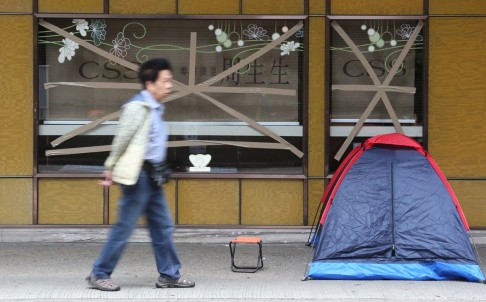
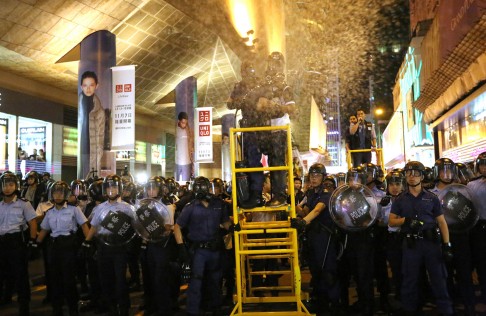










沒有留言:
張貼留言